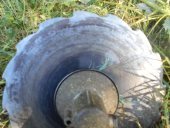I like hearing these stories of your real-world experiences, especially on this topic. It can be challenging enough to deal with the learning curve of a new technology/approach/paradigm, but social pressures can be even more difficult. Anyone else out there mowing the lawn in a more-or-less urban setting? The pressure of that tacit assumption that everyone is to mow their lawn "on schedule" is not nothing. Here in NE Iowa, where I've lived over half my life, I'm aware of several cases of people having the authorities called on them for grass that wouldn't have occurred to me was "too long."
On the flip side, haying--or just mowing--your lawn with a scythe is a potential opportunity to get to know your neighbors. Approaching your nearest neighbors with, "here's what I'm planning on doing, here's what the local ordinance says is OK in terms of grass length, so don't worry when you see the lawn getting longer than you're used to. And if you think it's getting too long, let me know and we'll assess the situation together," can break the ice and let them know that you're not just thinking, "f*ck them" (that is, that you're considering their needs). If things are too icy between you and your neighbor, write them a letter, leave them a note or send a text or email stressing their advantages (reduced noise & pollution/smell), what your rights are (check your local ordinance about maximum allowed grass length) and that you'd like to work together on this, giving them an extremely easy way for them to let you know if they're concerned (a number they can text, permission to just come knock on the door, where they should put a note if they want to write one), because who wants a cop showing up at the door?
Reel mowers are, environmentally speaking, wonderful things if you're willing to not only put in the human power to move the thing across the lawn (not that all gas mowers are easy to move!), but also mow more frequently, because they get a LOT harder to push when the lawn is even a little bit too long. (Maybe some models are better than others...anyone aware of a reel mower that does well in relatively long grass?) With the scythe, on the other hand, it's ideal to let the grass grow to the maximum-socially-acceptable length, which means less mowing than reel and gas mowers.







